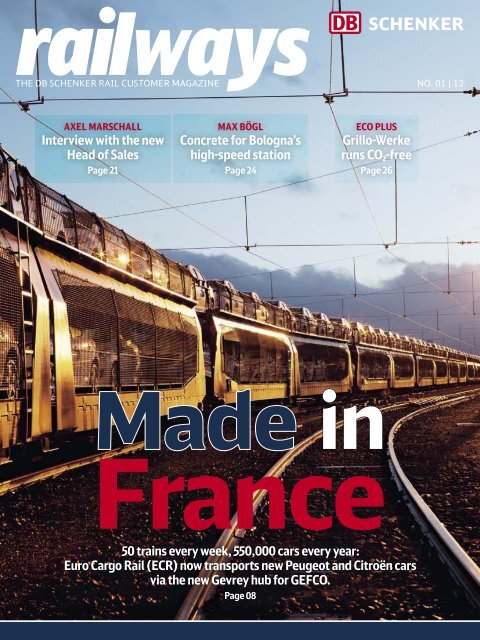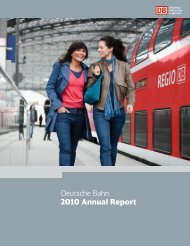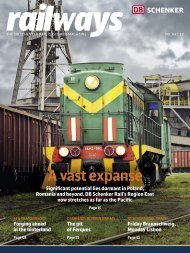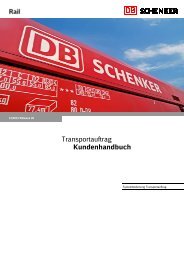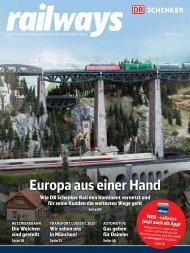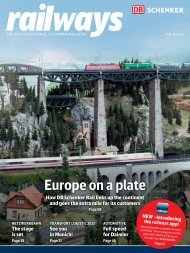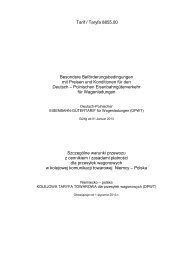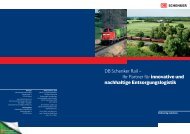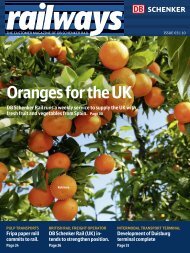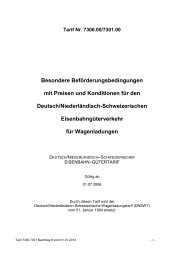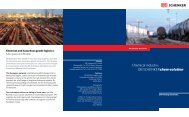You also want an ePaper? Increase the reach of your titles
YUMPU automatically turns print PDFs into web optimized ePapers that Google loves.
THE <strong>DB</strong> SCHENKER RAIL CUSTOMER MAGAZINE<br />
AXEL MARSCHALL<br />
Interview with the new<br />
Head of Sales<br />
Page 21<br />
MAX BÖGL<br />
Concrete for Bologna’s<br />
high-speed station<br />
Page 24<br />
ECO PLUS<br />
Grillo-Werke<br />
runs CO2-free<br />
Page 26<br />
Made in<br />
France<br />
50 trains every week, 550,000 cars every year:<br />
Euro Cargo <strong>Rail</strong> (ECR) now transports new Peugeot and Citroën cars<br />
via the new Gevrey hub for GEFCO.<br />
Page 08<br />
NO. 01 | 12
SuPeR heRoeS<br />
6A <strong>DB</strong> <strong>Schenker</strong> <strong>Rail</strong> locomotives<br />
4D 4D Dieselhydraulik Dieselhydraulik Lok Lok<br />
Class 152<br />
<strong>DB</strong> <strong>DB</strong> Baureihe Baureihe V90 V90<br />
kW/PS: kW/PS: 800/1100 800/1100 Anzugskraft: Anzugskraft: 201 201 kN kN<br />
Motoren: Motoren: 44<br />
Dienstmasse: Dienstmasse: 80,0 80,0 tt<br />
km/h: km/h: 80 80 Tankinhalt: Tankinhalt: 3000 3000 ll<br />
Länge: Länge: 14 14 mm<br />
Achsformel: Achsformel: B’B’ B’B’<br />
Bauzeit: Bauzeit: 1970-92 1970-92 Radsatzmasse: Radsatzmasse: 20,0 20,0 tt<br />
Anzahl: Anzahl: 408 408 Zugheizung: Zugheizung: – –<br />
Hersteller: Hersteller: MaK, MaK, Jung-Jungenthal, Jung-Jungenthal, Krupp, Krupp,<br />
Henschel, Henschel, Klöckner-Humboldt-Deutz Klöckner-Humboldt-Deutz (KHD) (KHD)<br />
Launch: 1996-2001 Total Fleet (<strong>DB</strong>): 170<br />
Power: 6,400 kW Manufacturer: KM, Siemens<br />
Speed: 140 km/h Tractive effort: 300 kN<br />
Weight: 87 t Length: 19.6 m<br />
Special features: —<br />
Countries of Operation: Germany<br />
02 | railways<br />
D<br />
ADLER’S SUCCESSOR: All 152 locomotives are based in<br />
Nuremberg, where Germany’s first locomotive, the Adler,<br />
first got up steam in 1835.<br />
German Long-Distance Runner<br />
The Class 152, which has been in use on<br />
Germany’s rails since 1996, is one of the<br />
last locomotives to be built under the leadership<br />
of Krauss-Maffei. The legendary<br />
Bavarian engine works was taken over by<br />
Siemens in 1999. Unlike newer designs,<br />
the 152 is not technically equipped for<br />
cross-border journeys. The extremely reli-<br />
able machines have, however, proven<br />
19,6 m<br />
themselves as long-distance haulers on <strong>DB</strong><br />
<strong>Schenker</strong> <strong>Rail</strong>’s domestic German services<br />
and are, at 8,700 hp, among Europe’s<br />
strongest freight locomotives.<br />
Title Photo: Beat Schweizer/Anzenberger.com / Photos: Rüdiger Wölk/Imago; Deutsche Bahn AG; Kai Hartmann/<strong>DB</strong> <strong>Schenker</strong> <strong>Rail</strong><br />
Dear Readers,<br />
You’ll be seeing a new face and reading new handwriting in this column. The<br />
supervisory board of <strong>DB</strong> <strong>Schenker</strong> <strong>Rail</strong> appointed me as Head of Sales of our<br />
company with effect from 1 February 2012. I am pleased to be taking on this responsible<br />
role. I am aware of the huge challenges that await me and the high demands<br />
that you, our customers, will be placing on me. Please read more on this<br />
subject on page 20!<br />
In this edition, I’d like to draw your attention towards France. Our young and no longer<br />
small French national company, Euro Cargo <strong>Rail</strong>, is writing a real success story.<br />
ECR is now the largest private rail company in France and an integral interface of our<br />
European network. ECR connects central Europe with Great Britain and Spain.<br />
Companies from a wide range of sectors are entrusting growing freight volumes to<br />
our French company and have provided it with a turnover growth of 60 per cent in<br />
the last year. And now, Euro Cargo <strong>Rail</strong> has secured another coup: since the beginning<br />
of the year, our French colleagues have been working for logistics operator GEF-<br />
CO to transport Peugeot and Citroën cars. As part of this contract, more than half a<br />
million new cars will be shipped on European rails during 2012. We’re in a very optimistic<br />
mood in France.<br />
With a market share of 26.5 per cent, <strong>DB</strong> <strong>Schenker</strong> <strong>Rail</strong> is now Europe’s largest rail<br />
freight company. We also want to be the best –whether we succeed is up to you to decide,<br />
not us.<br />
Put us to the test!<br />
Best regards,<br />
Axel Marschall<br />
Member of the Management Board<br />
<strong>DB</strong> <strong>Schenker</strong> <strong>Rail</strong><br />
railways | 03
CONTENTS<br />
08<br />
02 Super Heroes<br />
06 news<br />
34 on the Move<br />
35 Save the date<br />
& imprint<br />
Cover story:<br />
Made in France<br />
French automotive logistics firm GeFco was looking<br />
for a new partner for transporting new cars and<br />
found one in euro cargo rail (ecr).<br />
04 | railways<br />
Markets & innovation<br />
20 Home game for Marschall<br />
Axel Marschall, the new Head of Sales at<br />
<strong>DB</strong> <strong>Schenker</strong> <strong>Rail</strong> introduces himself in an<br />
interview with railways and explains his<br />
goals<br />
customers & projects<br />
22 Feed for porkers<br />
ECR has won a major contract, transporting<br />
animal feed in France for Cooperl<br />
23 corn for europe<br />
Transporting wheat and maize is a<br />
demanding business. <strong>DB</strong> <strong>Schenker</strong> <strong>Rail</strong><br />
Romania has seen a rapid increase in<br />
transport volumes<br />
24 High Speed on concrete<br />
On behalf of Max Bögl, <strong>DB</strong> <strong>Schenker</strong> <strong>Rail</strong><br />
has delivered 6,000 tonnes of slab track<br />
units for Bologna’s new station<br />
25 pipes on rails<br />
<strong>DB</strong> <strong>Schenker</strong> <strong>Rail</strong> transported 761 wagons<br />
of pipes for Salzgitter Mannesmann<br />
Großrohr GmbH<br />
26 a Tradition of progress<br />
Grillo-Werke in Duisburg is the tenth<br />
customer to book Eco Plus and thereby<br />
enjoy completely CO 2 -free rail transport in<br />
Germany<br />
27 “coil hotel” Hagen celebrates its Birthday<br />
<strong>DB</strong> <strong>Schenker</strong> <strong>Rail</strong>’s largest warehouse for<br />
the metals and coal industry in Germany is<br />
ten years old<br />
28 news from dB <strong>Schenker</strong> rail (uK)<br />
The British <strong>DB</strong> subsidiary is to transport<br />
78,000 MINIs from Oxford to the port of<br />
Southampton this year. <strong>DB</strong> <strong>Schenker</strong> <strong>Rail</strong><br />
(UK) is also expanding its connections<br />
through the channel tunnel and strengthening<br />
its cooperation with the container<br />
shipping group CMA CGM<br />
30 news from Transfesa<br />
<strong>DB</strong>’s Spanish subsidiary, Transfesa Auto<br />
<strong>Rail</strong>, has set up a car train network be-<br />
tween Barcelona, Madrid, Zaragoza and<br />
Seville – and expanded its activities for<br />
Opel<br />
company & people<br />
31 More punctual over Belt and Sound<br />
The introduction of capacity booking has<br />
increased the punctuality of single-wagon<br />
transport between Sweden and Germany<br />
to 95 per cent<br />
32 co2-free in the united Kingdom<br />
Already available in Germany and planned<br />
in the UK: rail freight transport with zero<br />
greenhouse gas emissions<br />
33 call for locos from Spain<br />
For use on the growing Spanish standard<br />
gauge network, Transfesa has acquired<br />
used diesel locomotives from its British<br />
sister company, <strong>DB</strong> <strong>Schenker</strong> <strong>Rail</strong> (UK)<br />
33 Small but powerful<br />
The Hungarian <strong>DB</strong> national subsidiary LCH<br />
celebrates its tenth anniversary<br />
Photos: Beat Schweizer/Anzenberger.com; ddp images/AP Photo/Vadim Ghirda<br />
Made<br />
in<br />
France<br />
corn For europe<br />
railways | 05
NEWS<br />
06 | railways<br />
PARIS, FRANCE<br />
LONGER ANd FASTER<br />
dUISBURG/GERMANY<br />
CLOSER TO CLIENTS FOR SALES<br />
ANd PROdUCTION<br />
<strong>DB</strong> <strong>Schenker</strong> <strong>Rail</strong>’s customer services in Germany, based in Duisburg<br />
(formerly Customer Service Centre), has taken on a more customercentric<br />
structure since 1 January in order to focus on further developing<br />
this essential factor of influence for customer satisfaction.<br />
As a result, a central “European Customer Service and Support” unit<br />
has been created within the <strong>DB</strong> <strong>Schenker</strong> <strong>Rail</strong> sales division, which<br />
drives the scope and quality of Europe-wide customer services<br />
according to shared principles and processes across all service functions.<br />
The head of the new European Customer Services unit is Jens Küter<br />
(photo), who was previously responsible for running the Customer<br />
Service Centre.<br />
The existing customer service functions of industry service, wagon<br />
management and order management were each aligned to the five<br />
market areas and will be the direct responsibility of each market area<br />
director. Furthermore, the production functions formerly bundled<br />
together in Duisburg were tethered to the corresponding production<br />
units of <strong>DB</strong> <strong>Schenker</strong> <strong>Rail</strong>.<br />
The new structure creates a distinct interface between sales<br />
and production, and guarantees sales the best possible cooperation<br />
with production to enable them to fulfil customer requirements. dv<br />
Euro Cargo <strong>Rail</strong> (ECR) is celebrating a premiere for French freight<br />
transport: working with its customer T3M, the <strong>DB</strong> <strong>Schenker</strong> <strong>Rail</strong><br />
subsidiary put a regular 833 m-long freight train on the rails for<br />
the first time on 10 January, running it at 120 km/h. The train<br />
travels between Paris and Marseilles (848 km) five times a week.<br />
Until now, only freight trains with a maximum length of 750 m<br />
and a maximum speed of 100 km/h were permitted in Paris. The<br />
infrastructure on the line had to be altered to accommodate the<br />
higher speed and greater length. dv<br />
Photos: PR<br />
Paris<br />
duisburg<br />
Berlin<br />
Poznań<br />
POzNAń, POLANd<br />
NON-STOP SHUTTLE<br />
CONCEPT TO POLANd<br />
Since December, transports between Western Europe and Poland<br />
resulting from the cooperation between <strong>DB</strong> <strong>Schenker</strong> <strong>Rail</strong> and Polzug<br />
Intermodal, the market leader for intermodal transport to Poland,<br />
have been operating using direct shuttle trains with multisystem<br />
locomotives. Each week, 15 pairs of trains run between<br />
Hamburg and Bremerhaven and the economic and industrial centre<br />
Poznań in western Poland. End-to-end responsibility for the transports<br />
lies with <strong>DB</strong> <strong>Schenker</strong> <strong>Rail</strong>. From the German-Polish border,<br />
the trains are operated by the Polish subsidiary <strong>DB</strong> <strong>Schenker</strong> <strong>Rail</strong><br />
Polska. At the HUB Terminal Poznań, operated by Polzug Intermodal,<br />
the containers are loaded onto domestic Polish shuttle trains to<br />
connect with Poland’s major economic centres. The direct shuttle<br />
trains grant consignments shorter transport times and mean that<br />
they are more reliable. dv<br />
BERLIN, GERMANY<br />
RAIL FREIGHT COMPANIES FOR<br />
BETTER INFRASTRUCTURE<br />
Four leading rail freight logistics companies from central<br />
Europe now want to plead their case with one single voice<br />
to politicians and national infrastructure operators for the<br />
expansion of important European freight corridors. In Berlin,<br />
the chairmen of <strong>DB</strong> <strong>Schenker</strong> <strong>Rail</strong>, TX Logistik (Germany),<br />
SBB Cargo (Switzerland) and BLS Cargo (Switzerland)<br />
presented to the public their common position on freight<br />
corridor 1 from Rotterdam/Antwerp via Duisburg,<br />
Mannheim, Basel and Milan to Genoa. They pointed out<br />
the current bottlenecks at Oberhausen, Basel, Chiasso and<br />
Milan, and stressed that an extended freight route from<br />
the North Sea to the Mediterranean would need to be suitable<br />
for 1,500 m-long trains and ensure considerably faster<br />
and simpler operations. The initiative is coordinated by the<br />
Community of European <strong>Rail</strong>way and Infrastructure Companies<br />
(CER). ok<br />
railways | 07
Cover STorY<br />
COGS IN MOTION:<br />
A shunter at the<br />
Gevrey hub, near<br />
Dijon, puts together<br />
trains of wagons<br />
carrying new cars<br />
from the PSA group.<br />
08 | railways<br />
Made in<br />
France<br />
euro Cargo rail (eCr) has has signed signed one one of<br />
of<br />
the the most most important important contracts contracts in in the<br />
the<br />
company’s company’s history. history. Since Since December, December, the<br />
the<br />
French French <strong>DB</strong> <strong>DB</strong> subsidiary subsidiary has has been been transtransportingporting<br />
the the PSA PSA group’s group’s new new Peugeot<br />
Peugeot<br />
and and Citroën Citroën cars cars on on behalf behalf of of GeFCo.<br />
GeFCo.<br />
Photos: Beat Schweizer/Anzenberger.com; GEFCO; Illustrationen: illuteam43<br />
50 across its borders for GEF-<br />
trains every week – 550,000<br />
new cars transported every<br />
year. The freight volume<br />
that ECR has been transporting<br />
through France and<br />
CO since December is a milestone and a record<br />
for the <strong>DB</strong> subsidiary founded only seven years<br />
ago. This large-scale order by GEFCO, the logistics<br />
company owned by the PSA Peugeot Citroën<br />
group, exceeds anything that ECR has done for<br />
the automotive industry so far.<br />
“The award of the contact which amounts tens<br />
of millions, is an enormous success for us,” says<br />
ECR Managing Director Emmanuel Delachambre.<br />
“Thanks to our flexible and innovative transport<br />
concept, we were able to replace the French<br />
freight company Fret SNCF, to which this contract<br />
had previously been entrusted.”<br />
In doing so, ECR capitalises on its reaction<br />
speed, among other assets: there were only six<br />
months between the initial contact from the customer<br />
and the final bid – a very short time when<br />
you consider all the necessary preparations and<br />
the coordination of production, planning, purchasing,<br />
IT, HR and security.<br />
Under extreme time pressure, the logistics<br />
experts at ECR developed a new and conclusive<br />
concept for the distribution of new cars, which<br />
persuaded GEFCO (see interview on page 16).<br />
After an in-depth investigation of the current<br />
production flow organisation and the transport<br />
volume, ECR presented the customer GEFCO<br />
with a proposal to reorganise the flow of goods<br />
with a central hub in Gevrey, near Dijon.<br />
railways | 09
Cover STorY<br />
This hub in Burgundy is where almost all<br />
trains meet with new cars from the five PSA<br />
plants in France and two other factories in the<br />
Czech Republic and Slovakia, to be sorted into<br />
trains to 15 distribution centres in France and<br />
other European countries. Gevrey is one of the<br />
largest shunting yards in the country – ECR has<br />
leased half of the tracks from the French infrastructure<br />
operator RFF. There alone, the <strong>DB</strong> subsidiary<br />
has taken on 30 new employees. GEFCo<br />
has set up a second, smaller hub in Achères, near<br />
Paris, so that it can also process wagons from the<br />
PSA factories in Aulnay and Poissy.<br />
“With our innovative<br />
transport concept, we<br />
were able to prevail”<br />
GEFCo has a large fleet of its own wagons for<br />
transporting new Peugeot and Citroën cars. Euro<br />
Cargo <strong>Rail</strong> provides the long-haul and shunting<br />
locomotives and puts the trains together in the<br />
two hubs. ECR also uses the extensive network<br />
of <strong>DB</strong> <strong>Schenker</strong> <strong>Rail</strong>, Europe’s leading rail freight<br />
company, to offer efficient solutions for international<br />
transport beyond all borders of France.<br />
“our customers can benefit more than ever<br />
from cross-border synergies,” says ECR head Delachambre,<br />
“<strong>DB</strong> <strong>Schenker</strong> <strong>Rail</strong>’s pan-European network<br />
is growing and blossoming.” This means that<br />
GEFCo can rely on a mature, Europe-focused company<br />
that also efficiently operates long-haul trains<br />
across borders to northern and eastern Europe.<br />
Innovative concept –<br />
shared responsibility<br />
EmmanuEl DElachambrE<br />
For its massive contract for GEFCo, ECR is also<br />
relying on cooperation with the private French<br />
rail freight companies Europorte and Colas,<br />
each of which takes on part of the transport<br />
Continued on page 15 -><br />
10 | railways<br />
TurnTablE: The Gevrey shunting yard is one<br />
of the largest in France. ECR has leased half of<br />
the tracks to its new customer, GEFCO.<br />
manPOWEr:<br />
ECR has taken<br />
on 30 new<br />
employees in<br />
Gevrey.<br />
railways | 11
Cover STorY<br />
laDDEr TraCK:<br />
This is what railwaymen call the strict design plan for a<br />
marshalling yard that looks a bit like the rungs of a ladder<br />
or the strings of a musical instrument – as you can see in<br />
our diagram. Freight trains come in through the receiving<br />
yard (left), are split into individual wagons or wagon<br />
groups and, using a hump, reconfigured according to their<br />
destination with the next destination group to the right.<br />
Then, the GEFCO car trains leave the hub, organised as<br />
required, and head off in all directions (far right).<br />
12 | railways<br />
Receiving yard<br />
Hump<br />
Marshalling yard<br />
COuPlED uP:<br />
An ECR employee<br />
connects the compressed-air<br />
line<br />
between two wagons.<br />
bluE FlEET:<br />
ECR uses its own<br />
locomotives, the<br />
wagons belong to<br />
GEFCO.<br />
The new eCr huB For GeFCo<br />
Gevrey hub<br />
Euro Cargo <strong>Rail</strong> has made Gevrey near Dijon the central hub<br />
for its transports for GEFCO. Like all of Europe’s large shunting<br />
yards, this one is around 3,500 metres long – about the<br />
same length as the runway for an Airbus A380 or a jumbo jet.<br />
ECR has leased 37 sorting sidings (shown in blue in the<br />
diagram), and the remaining lines are used by other rail<br />
Departure yard<br />
companies. It only takes about two and a half hours for ECR to<br />
sort the “colourful” car trains from the PSA factories according<br />
to their different destinations (A, B, C, D, outside left) and<br />
prepare them for their onward journeys within France or right<br />
across Europe. ECR and its partners run approx. 50 trains a<br />
day for GEFCO, most of them via Gevrey.<br />
railways | 13
Cover STorY<br />
PlaY OF COlOurS: In France, the<br />
<strong>DB</strong> <strong>Schenker</strong> <strong>Rail</strong> locos don't come<br />
in red, but in white and grey.<br />
14 | railways<br />
rEaDY TO GO: A train full of new Peugeots<br />
and Citroëns waiting in Gevrey to depart to a<br />
French or foreign distribution centre.<br />
(see map below). “Our solution is also<br />
innovative in terms of production,”<br />
says Ben Smail, Commercial Director at<br />
ECR. “By working with other private<br />
operators from the freight sector, we<br />
enable our customers to be independent<br />
and not just rely on one supplier.”<br />
In view of the significance of this<br />
proposal, ECR has brought proven<br />
partners on board, although it handles<br />
80 per cent of the transport itself and<br />
takes overall responsibility for GEFCO.<br />
Emmanuel Delachambre: “This means<br />
that we control the majority of the flow<br />
of goods and all operations via our new<br />
hub at Gevrey.” ECR also maintains<br />
capacity for increasing traffic and adding<br />
new customers at the huge shunting<br />
yard in Burgundy.<br />
In general, the automotive industry<br />
is particularly dependent on changing<br />
demand: as a result, as a service provider<br />
to GEFCO and PSA, ECR has to<br />
handle fluctuating volumes, integrating<br />
them into a flexible production plan. To<br />
do this, ECR draws on its own expertise<br />
in the automotive sector as a partner to<br />
a number of well-known manufacturers,<br />
The network for GeFCo<br />
“The majority<br />
of our transports<br />
for GEFCO go<br />
via Gevrey”<br />
EMMaNuEl DElaChaMbrE<br />
as well as on the know-how gathered<br />
over the years by <strong>DB</strong> <strong>Schenker</strong> <strong>Rail</strong>.<br />
Europe’s leading rail freight company<br />
enjoys an excellent reputation in<br />
France for innovation and punctuality.<br />
“With this large new client, we can<br />
strengthen our position in the French<br />
market,” says Delachambre. “Since ECR<br />
was founded seven years ago, we have<br />
managed to forge a rapid and sustained<br />
path to success in an intensely competitive<br />
market as a startup company. In<br />
the meantime, we have become one of<br />
the most important private providers<br />
in the French rail freight market and a<br />
strong competitor to Fret SNCF with a<br />
market share of 16 per cent in 2011 – and<br />
a continuing upward trend.” ok<br />
Contact | Nadja Rachow<br />
Tel. +33 (0) 9774 00047<br />
nadja.rachow@dbschenker.com<br />
railways | 15
Cover STorY<br />
InTervIew<br />
“A minor<br />
revolution”<br />
Antoine Redier, 47, vice president for<br />
vehicle logistics at GEFCO talks about<br />
the new cooperation with Euro Cargo<br />
<strong>Rail</strong> and the outlook for the European<br />
automotive industry.<br />
What are GEFCO’s expectations of its new<br />
logistics partner?<br />
Antoine Redier: What we expect from our partners<br />
is performance that meets the specifications:<br />
naturally, this includes transport, but<br />
also complete process transparency, including<br />
any difficulties that may arise. In the event of<br />
any problems, we expect our logistics partners<br />
to produce a corrective action plan that we can<br />
jointly follow.<br />
Why did GEFCO change its supplier?<br />
Redier: Our decision to change supplier in<br />
France was a difficult one to make. We had<br />
been using one single rail carrier in France for<br />
decades, right up until the end of 2010. The<br />
change in December 2011 was to complete the<br />
transition from this carrier to a system with<br />
three independent carriers and two rail hubs.<br />
For us, this constituted a minor revolution. We<br />
wanted to balance our supplier portfolio to ensure<br />
that we didn’t switch from one monopoly<br />
to another. We expect more reliability and<br />
flexibility for our consignments, even if we<br />
know that this does not depend solely on the<br />
performance of the rail carrier –the infrastructure<br />
in France also plays an important role. We<br />
expect that transport times will be significantly<br />
reduced while costs remain the same, and<br />
that any consignment risks can be identified<br />
easily. All of this should also contribute to a reduction<br />
in transport damage, which leads to<br />
additional costs and delivery delays for our<br />
customers.<br />
What challenges have you seen with the transition<br />
from the old production system to the new<br />
process suggested by ECR?<br />
Redier: Previously, GEFCO’s rail transport was<br />
very simple: we handed over the wagons to our<br />
previous carrier, and stated their destination.<br />
It was the carrier’s responsibility to take them<br />
to their destination, bearing in mind certain re-<br />
aNTOINE rEDIEr: “The automobile market is a strategic market for the European industry”<br />
quirements with regard to frequency and volume,<br />
while we waited for them to be unloaded<br />
at their destination. Today, we have an extra responsibility<br />
to ensure that loading quantities<br />
at the individual factories are coordinated to<br />
make up the trains at the various shunting<br />
yards according to their intended destinations.<br />
We have plenty of experience with this type of<br />
management for road or sea transport, but in<br />
terms of rail transport, this is something new.<br />
Above all, we have to coordinate three independent<br />
rail carriers.<br />
What is the outlook for the automobile market<br />
in the wake of the economic crisis affecting<br />
Europe?<br />
Redier: The automobile market is a strategic<br />
market for European industry and especially<br />
for GEFCO, as our business is closely linked to<br />
the automotive sector, with deliveries to factories,<br />
the sale of components or finished vehicles.<br />
We can look at the matter from a<br />
number of different perspectives: in western<br />
Europe, we have almost 500 cars per 1,000<br />
people. If we look at the concerns of the population<br />
with regard to the economy and the environment,<br />
this of course means that we need<br />
to maintain this level: short-term leasing, car<br />
sharing and car hire are becoming more and<br />
more popular. The western European market is<br />
therefore mainly a market for vehicle exchange<br />
with low growth in the private sector, but on<br />
the other hand, there’ll be definite forward momentum<br />
in terms of the logistics of hired vehicles.<br />
Certain European countries have been<br />
severely affected by the economic crisis, primarily<br />
those in southern Europe. These once<br />
important markets will need a little time to digest<br />
the economic crisis. The main risk concerns<br />
credit: buying a car is a considerable<br />
investment and often requires the buyer to<br />
take out a loan. If access to credit is limited,<br />
there are fewer buyers and the automotive<br />
market will start to feel the impact. As I’m sure<br />
you understand, we don’t have highly optimistic<br />
expectations for 2012, but the purpose<br />
of logistics is to apply itself to every situation,<br />
and that’s exactly what we’ll do.<br />
FACTS & FIGureS<br />
GeFCo<br />
GEFCO is one of Europe’s leading transport and<br />
logistics firms. The company, founded in 1949<br />
and part of the PSA Peugeot Citroën automotive<br />
group, works for a number of international<br />
groups, including big names from the automotive<br />
industry and components suppliers, air and<br />
space travel, electronics, consumer goods,<br />
investment goods and equipment industries.<br />
GEFCO employs 9,400 people in 29 countries<br />
throughout Europe, North Africa, Asia and<br />
South America. In 2010, the group recorded a<br />
turnover of €3.4 billion, more than three<br />
www.gefco.net<br />
quarters of which came from overseas markets.<br />
A good third of the annual turnover stemmed<br />
from outbound automotive logistics. GEFCO<br />
transported 2.7 million cars, half of them by rail<br />
and half by sea.<br />
www.gefco.net<br />
16 | railways railways |<br />
17
Cover STorY<br />
FACTS & FIGureS<br />
euro Cargo rail<br />
The private French rail freight company Euro Cargo <strong>Rail</strong> (ECR)<br />
was founded in 2005 and became part of the <strong>DB</strong> Group in<br />
November 2007 with the takeover of the British company EWS<br />
(now <strong>DB</strong> <strong>Schenker</strong> <strong>Rail</strong> UK). The company, based in Paris, is an<br />
important link in the European <strong>DB</strong> <strong>Schenker</strong> <strong>Rail</strong> network today,<br />
allowing international long-haul transport from central Europe<br />
to Spain and Great Britain in addition to national transport in<br />
France.<br />
eCr In FIGureS:<br />
• 830 employees<br />
• 2,000 wagons<br />
• 135 locomotives<br />
• 60 French customers with 155 destinations in Europe<br />
• €110 million turnover (2010)<br />
• Head office: Paris<br />
In 2011, ECR increased its turnover by 60 per cent and came<br />
close to a balanced result for the first time. With the large<br />
GEFCO contract, ECR is set to grow even more in 2012 and will<br />
further increase its market share as France’s largest private rail<br />
freight company from 16 per cent (2011).<br />
www.eurocargorail.com<br />
18 | railways<br />
Photo: Euro Cargo <strong>Rail</strong> PR<br />
railways | 19
MarKets & InnovatIon<br />
Home game for Marschall<br />
The new Head of Sales at <strong>DB</strong> <strong>Schenker</strong> <strong>Rail</strong> wants to further<br />
strengthen the link between railways and logistics.<br />
It’s only logical for someone like me, born in Mainz,<br />
to end up working in the rail freight industry one<br />
day,” says Axel Marschall, alluding to the <strong>DB</strong><br />
<strong>Schenker</strong> <strong>Rail</strong> headquarters in the state capital of<br />
Rhineland-Palatinate. The 46-year-old took up the<br />
role of acting Head of Sales of <strong>DB</strong> <strong>Schenker</strong> <strong>Rail</strong> in<br />
November 2011, and on 1 February, he was finally<br />
appointed permanently to the post. Axel Marschall<br />
succeeds Karsten Sachsenröder, who left the company<br />
at the beginning of November (see railways<br />
5/11, page 6).<br />
The link between railways and logistics has fascinated<br />
Marschall throughout his entire career. After<br />
studying business administration in Cologne from<br />
1988 to 1992, he initially worked as a business consultant<br />
for Gemini Consulting, before joining the <strong>DB</strong><br />
Group in 1999. After his entry position as head of the<br />
“Projects Group Development” department, he took<br />
over as head of the central strategy department of<br />
<strong>DB</strong> <strong>Schenker</strong> in 2005. From 2009, he ran the Automotive<br />
division of <strong>DB</strong> <strong>Schenker</strong> <strong>Rail</strong> and then the<br />
newly created <strong>DB</strong> <strong>Schenker</strong> <strong>Rail</strong> Automotive GmbH<br />
from 2010. Axel Marschall will stand down from this<br />
position as soon as a successor has been nominated,<br />
which is set to happen in the coming weeks.<br />
“Axel Marschall and his colleagues have expanded<br />
<strong>DB</strong> <strong>Schenker</strong> <strong>Rail</strong>’s Automotive division into the<br />
largest and most powerful automotive rail logistics<br />
company in Europe. He has worked with customers<br />
to develop successful international solutions. Axel<br />
Marschall brings with him the expertise that we need<br />
to successfully expand our European sales,” says Dr<br />
Karl-Friedrich Rausch, board member responsible<br />
for Transportation and Logistics at <strong>DB</strong> Mobility Logistics<br />
AG and chairman of the supervisory board of<br />
<strong>DB</strong> <strong>Schenker</strong> <strong>Rail</strong> GmbH.<br />
Marschall lives in Frankfurt am Main, and is married<br />
with four daughters and one son, aged between<br />
one and twelve. In our interview (right) he talks<br />
comprehensively about his goals and announces that<br />
Kontakt “we will | focus Nadja even Rachow more intensively on our custom-<br />
Telefon: ers’ processes +33 (0)9 than 774000-47 before.” ok<br />
nadja.rachow@dbschenker.com<br />
Photos: Kai Hartmann/<strong>DB</strong> <strong>Schenker</strong> <strong>Rail</strong><br />
“Positioning sales<br />
as the middle man”<br />
Axel Marschall answers a few questions for railways.<br />
What were your feelings at the beginning of February<br />
when you took up your new position as European<br />
Head of Sales for <strong>DB</strong> <strong>Schenker</strong> <strong>Rail</strong>?<br />
Axel Marschall: It felt good. <strong>Rail</strong> freight transport in<br />
Europe has a great future and many opportunities – for<br />
reasons such as climate protection, energy efficiency<br />
and increasing transport distances. As the European<br />
market leader, <strong>DB</strong> <strong>Schenker</strong> <strong>Rail</strong> is starting from an<br />
excellent position.<br />
Mr Marschall, you’ve now been in office for over 100 days,<br />
although the first few weeks were just on an interim basis.<br />
How is it going so far?<br />
Marschall: We’re in a good position, and we’re working<br />
in an attractive growth market. Nevertheless, competition<br />
is getting considerably tougher and markets<br />
and customer requirements are changing very dynamically.<br />
Apart from continually developing our core<br />
business, we will expand our European network and<br />
implement new production and sales procedures. <strong>DB</strong><br />
<strong>Schenker</strong> <strong>Rail</strong> has already grown strongly in Europe.<br />
What are your targets for this year and for the future?<br />
Marschall: I would like to position sales even more<br />
effectively as a middle man between customer and<br />
corporate interests and strengthen the economic prospects.<br />
In concrete terms, we have started to optimise<br />
our customer services functions. For instance, we<br />
have created a central “European Customer Service<br />
and Support” unit, which is part of the sales division<br />
and drives the scope and quality of Europe-wide customer<br />
services across all service functions. In close<br />
collaboration with production, the sales division will<br />
implement process innovations across all business<br />
sectors that will enable us to focus even more intensively<br />
on our customers than before. Customer focus<br />
takes very high priority for me. Furthermore, we will<br />
be taking care of our fleet of wagons and strengthening<br />
future sectors. All these changes will be communicated<br />
openly, so that both customers and employees<br />
know where we are headed.<br />
In Germany, where you earn almost three quarters of your<br />
turnover, you didn’t make it into the black in 2011. What can<br />
you do from a sales perspective?<br />
Marschall: In our core market, we did indeed suffer<br />
a sharp decline in our margins in 2011, despite<br />
growth. For us, the most important thing is to concentrate<br />
on working towards the future, in close<br />
collaboration with our customers. But I also want<br />
to stress that we must tailor our prices and structures<br />
according to cost trends to ensure that rail<br />
freight transport remains attractive in the long<br />
term.<br />
While Europe’s flow of freight is becoming more and more<br />
international, rail freight transport often still struggles with<br />
national borders.<br />
Marschall: That’s a central topic for us. We take care<br />
of our customers across national borders and we have<br />
already developed many solutions to that end. We’re<br />
innovative here too, if you consider our Daimler concept<br />
or the new transports from the UK to the Netherlands<br />
or Poland via the channel tunnel. The<br />
essential goal is to increase the frequency of international<br />
transport and to operate those transports<br />
smoothly across system borders. This firstly leads to<br />
better prices, and secondly ensures that our customers<br />
can organise their transports more efficiently.<br />
If you could make three wishes for your new job, what would<br />
they be?<br />
Marschall: Firstly, enough time for customers and<br />
staff, secondly the courage to follow through consistent<br />
prioritisation, and thirdly increases in productivity<br />
across all divisions.<br />
And if you had three private wishes,<br />
what would they be?<br />
Marschall: Experiences with<br />
family and friends, health and<br />
optimism.<br />
Do you have a personal role model,<br />
and if so, who?<br />
Marschall: Everyday heroes<br />
with civil courage.<br />
As someone from Mainz, what costume<br />
did you wear for the last carnival<br />
season?<br />
Marschall: Motocross rider.<br />
What’s your favourite toy? Model<br />
railway or … ?<br />
Marschall: Model cars that<br />
also travel by rail!<br />
“Customer<br />
foCus takes high<br />
priority”:<br />
Marschall wants to<br />
collaborate closely<br />
with customers to<br />
develop future-<br />
oriented concepts.<br />
20 | <strong>Rail</strong>ways <strong>Rail</strong>ways | 21
CustomErs & ProjECts<br />
Grain train<br />
in France:<br />
ECR anticipates<br />
rising demand for<br />
feed transports.<br />
Feed for Porkers<br />
ECR has won a major contract, transporting<br />
animal feed in France for Cooperl.<br />
As the leading French producer of pork products,<br />
Cooperl uses huge quantities of cereals for pig<br />
feed. To transport this feed, the cooperative<br />
uses the services of Euro Cargo <strong>Rail</strong> (ECR). The <strong>DB</strong><br />
<strong>Schenker</strong> <strong>Rail</strong> subsidiary is already well-positioned<br />
for grain haulage in western France – and since the<br />
beginning of the year has been transporting feed from<br />
the suppliers’ warehouses to the Cooperl factories in<br />
the Brittany towns of Plestan and Vitré.<br />
A volume of 200,000 tonnes is planned for this<br />
year, with three return trips taking place each week.<br />
All transports use the same train – a production<br />
method that ensures a good use of resources. By doing<br />
this, ECR guarantees its customer fixed departure<br />
times and flexible responses to possible changes in<br />
departure location.<br />
“The reactions from Cooperl to the first transports<br />
we have completed have been very positive,” says<br />
Philippe Jamard, responsible for grain transports at<br />
ECR. “This gives us cause for optimism that we’ll be<br />
transporting larger volumes for this customer in the<br />
future.” dv<br />
Contact | Nadja Rachow<br />
Tel: +33 (0)9 774000-47<br />
nadja.rachow@dbschenker.com<br />
Photos: ddp images/AP Photo/Vadim Ghirda; Cooperl<br />
Corn for Europe<br />
Transporting wheat and maize is a demanding business.<br />
<strong>DB</strong> <strong>Schenker</strong> <strong>Rail</strong> Romania has seen a rapid increase in transport volumes.<br />
Cereal exports are a tradition in Romania. In the<br />
time of the Hapsburg Empire, Austro-Hungary<br />
was fed by wheat from this country in southeast<br />
Europe. And today, thanks to EU integration, Romanian<br />
grain is delivered to many countries. <strong>DB</strong> <strong>Schenker</strong><br />
<strong>Rail</strong> Romania has also played a role in this<br />
development.<br />
“The transport of wheat, maize and rapeseed is a<br />
growth sector for us,” says Eduard Iancu, Managing<br />
Director of the group’s Romanian and Bulgarian subsidiaries.<br />
“Last year, the proportion of our turnover<br />
increased almost sevenfold in comparison with 2010,<br />
now bringing it to 8.5 per cent. And we anticipate<br />
further rises.”<br />
In order to be able to meet the quality requirements<br />
of international producers, traders, transporters and<br />
handlers, <strong>DB</strong> <strong>Schenker</strong> <strong>Rail</strong> Romania bought 67 grain<br />
wagons from Germany last year. The possibility of<br />
offering end-to-end international transport is another<br />
important sales argument: many consignments<br />
cross several national borders on their way to Austria,<br />
Germany and Italy. And around half of the volume<br />
consists of cereals from Hungary, which are shipped<br />
onward from the Romanian port of Constanta on the<br />
Black Sea.<br />
Cereals are a seasonal product and what’s more, the<br />
quantities can vary significantly depending on harvest<br />
yield and market situation. As a result, demands<br />
on planning and flexibility are particularly high when<br />
it comes to the provision of rolling stock and line ca-<br />
pacity. As part of the European network of <strong>DB</strong> <strong>Schenker</strong><br />
<strong>Rail</strong>, Iancu’s team is able to very rapidly develop<br />
reliable concepts for its customers. “<strong>DB</strong> <strong>Schenker</strong> <strong>Rail</strong><br />
Romania is a young and dynamic company that always<br />
comes up with the right solution to meet our demands,”<br />
says Rossella Trombetta, Managing Director<br />
of the grain trading company Don Carlos Romania,<br />
which had around 10,000 tonnes of cereals shipped<br />
to Italy via <strong>DB</strong> <strong>Schenker</strong> <strong>Rail</strong> Romania last year. “We<br />
can rest assured that our transports will be operated<br />
to a very high standard, and we receive all the information<br />
we need to monitor our deliveries, even at very<br />
short notice.”<br />
Eduard Iancu is convinced that it won’t stop at the<br />
previous total volume of around 100,000 tonnes:<br />
“The growth potential is huge, because up to now we<br />
have only really served customers from western Romania.<br />
Together with our colleagues from <strong>DB</strong> <strong>Schenker</strong><br />
<strong>Rail</strong> Logistics and Forwarding we are now<br />
increasingly making efforts to secure orders from<br />
other parts of the country.” dv<br />
Contact | Bogdan Barbu<br />
Tel: +40 (0)21 33122-07<br />
bogdan.barbu@bahn.com.ro<br />
22 | <strong>Rail</strong>ways <strong>Rail</strong>ways | 23
CuStomerS & ProjeCtS<br />
High Speed on Concrete<br />
Modern high-speed trains no longer travel on gravel, but on ballastless<br />
tracks. On behalf of Max Bögl, <strong>DB</strong> <strong>Schenker</strong> <strong>Rail</strong> has delivered 6,000 tonnes<br />
of slab track units to Bologna.<br />
With 20 lines, the main station in Bologna,<br />
built in 1864, is one of the largest through<br />
stations in Europe. As the link between<br />
the lines to Florence, Verona and Milan, “Bologna<br />
Centrale” is an important hub for Italy. Its suitability<br />
for modern high-speed trains, however, is<br />
limited. Alongside the building of the fast Milan-<br />
Bologna-Naples line, the city is obtaining a new<br />
underground station exclusively for these highspeed<br />
trains. The tracks for this line, which will be<br />
laid on a 440-metre underground section in the station<br />
area, come from Germany, more specifically<br />
from Neumarkt in the Upper Palatinate in Bavaria,<br />
made by the construction company Max Bögl<br />
GmbH & Co. KG.<br />
Using six dedicated trains, <strong>DB</strong> <strong>Schenker</strong> <strong>Rail</strong><br />
transported 6,000 tonnes of slab track units to Bologna<br />
between September and just before Christmas.<br />
The FFB Slab Track Bögl is an innovative track solution<br />
that is made not with gravel and sleepers,<br />
but with prefabricated concrete slabs. This reduces<br />
maintenance requirements and achieves higher<br />
levels of safety and travel comfort with minimum<br />
wear on rolling stock.<br />
<strong>DB</strong> <strong>Schenker</strong> <strong>Rail</strong> transported 452 slab track<br />
Contact | Walter Obermeyer<br />
Tel. +49 (0)89 1308-3644<br />
walter.obermeyer@dbschenker.eu<br />
ConCrete for Bologna:<br />
Max Bögl supplies slab track units<br />
for the Italian high-speed line.<br />
units, each weighing 12.82 tonnes, with five of them<br />
fitting on one wagon. “In the station, we’ve given<br />
special attention to vibration and noise reduction,”<br />
explains Walter Obermeyer, customer support<br />
agent for Max Bögl at <strong>DB</strong> <strong>Schenker</strong> <strong>Rail</strong>. “That’s<br />
why the slab track units are almost twice as thick<br />
as normal and are fitted with an additional elastic<br />
mat on the underside.”<br />
From Neumarkt, the trains ran via Kufstein to<br />
Austria and then to Italy via Brenner. To achieve this,<br />
<strong>DB</strong> <strong>Schenker</strong> <strong>Rail</strong> worked with Lokomotion Gesellschaft<br />
für Schienentraktion mbH and <strong>Rail</strong> Traktion<br />
Company SpA (RTC). The trains were scheduled to<br />
arrive on Saturdays, allowing them to be unloaded<br />
over the weekend. “We always managed to achieve<br />
that, too,” says Obermeyer. Max Bögl can look back<br />
on many years of working with <strong>DB</strong> <strong>Schenker</strong> <strong>Rail</strong>,<br />
for instance during the construction of the Katzenburg<br />
Tunnel in southern Baden or tunnelling beneath<br />
the Schelde in Antwerp harbour. rb<br />
Photos: PR; Salzgitter Mannesmann Großrohr GmbH<br />
Pipes on rails<br />
<strong>DB</strong> <strong>Schenker</strong> <strong>Rail</strong> transported 761 wagons of pipes for<br />
Salzgitter Mannesmann Großrohr GmbH.<br />
Snow, ice, rain: despite adverse conditions, the<br />
Würzburg/Gemünden Pipe Transports logistics<br />
project for Salzgitter Mannesmann<br />
Großrohr GmbH was completed successfully. Using<br />
the single wagon system , 761 wagons were delivered<br />
quickly and securely to the satisfaction of<br />
the customer . “The staff at the production centres<br />
in Hanover and Nuremberg have done a great job,”<br />
praises Wolfgang Rebhan, Head of Regional Sales<br />
Nuremberg.<br />
The high-quality steel products were manufactured<br />
in the Salzgitter-Immendorf West factory. The<br />
bundled handover of the wagon groups to <strong>DB</strong><br />
<strong>Schenker</strong> <strong>Rail</strong> took place in Salzgitter-Beddingen.<br />
Twelve wagons carrying a total of 60 pipes were<br />
prepared for unloading in the reception area each<br />
day. They were then loaded onto trucks and taken<br />
to temporary external storage, before being brought<br />
to the building site. “Professional planning and<br />
quality execution of the transports themselves were<br />
particularly important,” says Manfred Rau, project<br />
manager in the Metals & Coal division.<br />
The success of these networkied logistics led to<br />
another order from the customer. A further 618<br />
wagons of pipes were turned around in Schwandorf<br />
up to November. Another 200 will follow after a<br />
break in production. rb<br />
Contact | Wolfgang Rebhan<br />
Tel. +49 (0)911 219 -1960<br />
wolfgang.rebhan@dbschenker.eu<br />
24 | <strong>Rail</strong>ways <strong>Rail</strong>ways | 25
CusTomErs & ProjECTs<br />
A Tradition of Progress<br />
Grillo-Werke AG in Duisburg is the tenth customer to book Eco Plus<br />
and thereby enjoy completely CO 2-free rail transport in Germany.<br />
The Grillo-Werke is one of the founding<br />
fathers of industry in the Ruhr<br />
region. The 170-year-old family<br />
company processes zinc and has a secondary<br />
interest in sulphur chemistry. This<br />
Grillo division has now become the tenth<br />
customer to book Eco Plus from <strong>DB</strong><br />
<strong>Schenker</strong> <strong>Rail</strong> – CO 2 -free rail transport<br />
within Germany. To achieve this, <strong>DB</strong> buys<br />
the electricity needed to run the transports<br />
from renewable sources. The CO 2<br />
saving achieved goes towards the customer’s<br />
climate account.<br />
In total, Grillo is set to transport<br />
ENERGY EFFiCiENCY: The new<br />
head office of Grillo-Werke in<br />
Duisburg-Hamborn is an excellent<br />
example of economical use of<br />
energy.<br />
75,000 tonnes of sulphuric acid/oleum,<br />
sulphur dioxide, dimethyl sulphate and<br />
hydrochloric acid. For transporting hazardous<br />
goods, Grillo also uses its own fleet<br />
of 80 pressurised vessel wagons, which<br />
were developed especially for the company<br />
and exceed current safety standards.<br />
They are fitted with derailment detectors,<br />
over-riding protection, optimised transfer<br />
facilities and rollover protection.<br />
A Tradition of Progress – under this<br />
motto, Grillo and its 1,700 employees feel<br />
committed to work towards improvement<br />
and innovation while holding on to prov-<br />
en successes. Future-oriented environment<br />
management plays an important<br />
part in this. By opting for Eco Plus, Grillo<br />
can apply this principle to its logistics<br />
processes, too. ok<br />
“Eco Plus fits in with our philosophy”<br />
Dr Joachim van de Flierdt (photo left), Head of Chemistry Division<br />
at Grillo-Werke, interviewed for railways<br />
Green logistics is said to be a popular trend – in reality,<br />
demand is limited. But Grillo doesn’t do things<br />
by halves. Why?<br />
van de Flierdt: Because climate-friendly transport<br />
fits in with our corporate philosophy. We first<br />
heard of Eco Plus in 2010, we contacted <strong>DB</strong><br />
<strong>Schenker</strong> <strong>Rail</strong> at the Transport Logistic 2011 exhibition<br />
in Munich, and have now concluded this contract<br />
for our chemistry division.<br />
What role does climate and environment protection<br />
play for Grillo-Werke?<br />
van de Flierdt: For us, economy and the protection<br />
of people and the environment are equally important<br />
business goals. The city of Duisburg honoured<br />
us with the ÖKOPROFIT business award in 2010 in<br />
recognition of our corporate responsibility.<br />
Contact | Dieter Wilhelm<br />
Tel. +49 (0)203 3017 3072<br />
dieter.wilhelm@dbschenker.eu<br />
Are there any other examples that reinforce this approach?<br />
van de Flierdt: Yes, of course – here are just two<br />
examples of many: at our Frankfurt-Höchst site, our<br />
sulphuric acid production plant also generates CO 2 -<br />
free energy, specifically 330,000 tonnes of steam<br />
and 42,500 megawatt hours (Mwh) of electricity.<br />
And our new head office in Duisburg is an example of<br />
maximum energy efficiency. It was designed to be 80<br />
per cent below the statutory energy conservation<br />
regulations.<br />
Photos: Private; Michael Reisch; PR<br />
The “coil hotel” in Hagen<br />
celebrates its Birthday<br />
The Metals & Coal Logistics Center in Hagen, <strong>DB</strong> <strong>Schenker</strong> <strong>Rail</strong>’s largest warehouse<br />
for the metals and coal industry in Germany, is ten years old<br />
More than ten years ago, on 9 November 2001,<br />
the company then known as <strong>DB</strong> Cargo<br />
opened the Logistikzentrum Montan (LZM<br />
– Metals and Coal Logistics Center) for the storage,<br />
handling, picking and distribution of steel coils. Many<br />
insiders almost affectionately call the facility the “coil<br />
hotel”. The location could scarcely have been better<br />
chosen. Hagen, the industrial city on the eastern edge<br />
of the Ruhr region, is a traditional centre of the steel<br />
processing industry.<br />
In addition to steel bars and wire, many of the businesses<br />
in the area produce rolled, split, refined or<br />
coated sheet materials. Customers include car manufacturers<br />
and parts suppliers, as well as many other<br />
sectors. The LZM is well connected, not only by rail<br />
but also via the A1, A45 and A46 German motorways.<br />
Within ten years, the LZM has become established<br />
as a central handling and storage location for coils,<br />
receiving supplies from steel producers in Germany,<br />
the Netherlands, Belgium, Italy and even China and<br />
India. With a floor area of 8,500 m 2 and a capacity of<br />
460,000 tonnes per annum, the logistics centre and<br />
its prime location enable just-in-time supplies to the<br />
industry – both by rail and by road.<br />
It has a high performance platform connection<br />
with a working length of 170 metres, 1,300 variable<br />
bays and two cranes with sensor-controlled coil grippers,<br />
capable of lifting up to 40 tonnes. The LZM also<br />
offers additional services such as the packing and unpacking<br />
of coils – to ensure they’re comfortable at the<br />
Hagen hotel. rb<br />
Contact | Heinz W. Weiß<br />
Tel. +49 (0)203 3017 2532<br />
Heinz.W.Weiss@dbschenker.eu<br />
Coil to Coil: The<br />
LZM is the link<br />
between international<br />
steel producers<br />
and their customers.<br />
26 | <strong>Rail</strong>ways <strong>Rail</strong>ways | 27
CuStOMerS & PrOjeCtS<br />
MINI takes the train<br />
This year, <strong>DB</strong> <strong>Schenker</strong> <strong>Rail</strong> (UK) will transport<br />
at least 78,000 MINIs from the BMW factory in<br />
Oxford to the port of Southampton in southern<br />
England for export.<br />
Demand for the cult MINI, made in the UK, is<br />
high in China, Japan and the US: that’s part of<br />
the reason why <strong>DB</strong> <strong>Schenker</strong> <strong>Rail</strong> (UK) was<br />
recently awarded the contract to transport at least<br />
78,000 new cars from the BMW factory in the historic<br />
university city of Oxford by rail to the export<br />
docks in Southampton on the south coast of England.<br />
Since 3 January, five MINI trains a week have been<br />
underway.<br />
“This new assignment is a superb start to the New Year<br />
for us,” says Lucja Majewski, Account Manager, Logistics at <strong>DB</strong><br />
<strong>Schenker</strong> <strong>Rail</strong> (UK). “This means that 65 per cent of all MINIs<br />
destined for export are now transported by rail.” It is possible that<br />
the number of new vehicles transported by <strong>DB</strong> could rise even<br />
further during the course of the year, because demand for the MINI<br />
is predicted to increase in overseas retail markets. ok<br />
CONtaINer-<br />
terMINal: CMA<br />
CGM relies on the<br />
rails.<br />
Gaining ground on the island<br />
Both companies want to bring more container<br />
transport onto the rails over the course of the<br />
year, further lightening the load on the roads.<br />
That’s why <strong>DB</strong> <strong>Schenker</strong> <strong>Rail</strong> UK and the world’s<br />
third largest container shipping group, CMA CGM,<br />
Contact | Lucja Majewski<br />
Tel: +44(0)1302 575-404<br />
lucja.majewski@dbschenker.com<br />
<strong>DB</strong> <strong>Schenker</strong> <strong>Rail</strong> (UK) and the container shipping group CMA CGM have<br />
agreed to expand shunting yards in central England and Southampton.<br />
FrOM<br />
OxFOrd tO<br />
the wOrld:<br />
The MINI is manufactured<br />
in the<br />
historic university<br />
city.<br />
have decided to intensify their cooperation, formalised<br />
with a two-year contract signed back in April<br />
2011. As part of their agreement, both parties have<br />
committed to creating additional capacity if demand<br />
should increase.<br />
The expansion of the infrastructure now proposed<br />
for various sites is directly linked to this intention<br />
and is set to further increase the market share for<br />
rail freight transport. Graham Fraser of CMA CGM<br />
explains, “This declaration of intent is important for<br />
us, because it opens up new ways to build up the use<br />
of rail freight transport. <strong>DB</strong> <strong>Schenker</strong> <strong>Rail</strong> (UK) has<br />
proven to be a dynamic partner that understands us<br />
and works with us towards our common goals.”<br />
Dr Carsten Hinne, Managing Director, Logistics at<br />
<strong>DB</strong> <strong>Schenker</strong> <strong>Rail</strong> UK, adds: “This agreement will<br />
ensure that CMA CGM brings more containers onto<br />
Offices on rails<br />
The British infrastructure operator Network <strong>Rail</strong> is moving to its new<br />
head office in Milton Keynes this spring. <strong>DB</strong> <strong>Schenker</strong> <strong>Rail</strong> (UK) is<br />
bringing office furniture from Switzerland by rail.<br />
Thousands of desks and office chairs will be delivered<br />
to the Birmingham freight terminal<br />
from Basel in the spring of 2012. To the southeast<br />
of this metropolis lies Milton Keynes, where<br />
British rail network operator Network <strong>Rail</strong> will now<br />
have its head office. Environmentally friendly transport<br />
fits the picture: “Our headquarters is set to be<br />
one of the most sustainable buildings in England, so<br />
it makes sense to encourage the use of rail transport<br />
wherever we can,” said Tim Coucher, project director<br />
at Network <strong>Rail</strong>. “By choosing <strong>DB</strong> <strong>Schenker</strong> <strong>Rail</strong>, we<br />
can save around 100,000 lorry journeys and cut CO 2<br />
emissions by 90 per cent.”<br />
Jonathan Bailey, Account Manager for International<br />
Logistics at <strong>DB</strong> <strong>Schenker</strong> <strong>Rail</strong> (UK), cites his<br />
<strong>DB</strong> <strong>Schenker</strong> <strong>Rail</strong> (UK) is promoting the development<br />
of direct connections with continental Europe<br />
company’s expertise: “We take care of the environment<br />
and our Europe-wide network offers a seamless<br />
transport solution that is tailored precisely to the<br />
needs of Network <strong>Rail</strong>.” The new headquarters building,<br />
known as The Quadrant: MK, will be the new<br />
workplace for 3,000 employees from 2012. This will<br />
bring planning and customer services under one roof,<br />
allowing customers to benefit from better service and<br />
shorter decision times. ok<br />
Six new trains through the tunnel<br />
the rails, in accordance with its objectives.” ok<br />
International rail freight transport via the Channel<br />
tunnel is really taking off. The existing 16<br />
weekly trains (per way) are likely to be joined<br />
by another six over the course of the year – two each<br />
from the United Kingdom to Italy, Poland and<br />
Contact | Dr Carsten Hinne<br />
Spain. David Kerr, Commercial Director of <strong>DB</strong><br />
Tel: +44 (0)1302 5750-37<br />
<strong>Schenker</strong> <strong>Rail</strong> (UK): “We are building on our com-<br />
carsten.hinne@dbschenker.com<br />
mitment to long-distance European transport and<br />
Photos: PR<br />
Contact | Jonathan Bailey<br />
Tel: +44 (0)1302 575-793<br />
jonathan.bailey@dbschenker.com<br />
making good use of <strong>DB</strong> <strong>Schenker</strong> <strong>Rail</strong>’s pan-European<br />
network.” The new connections are backed by<br />
the recent successful authorisation of the larger<br />
European wagon profile for the High Speed One<br />
route between the tunnel portal in Folkestone and<br />
London (see railways 5/11, page 38). ok<br />
Future headquarterS:<br />
The new Network<br />
<strong>Rail</strong> head office is set<br />
to be one of the most<br />
ecological buildings<br />
in England.<br />
28 | <strong>Rail</strong>ways <strong>Rail</strong>ways |<br />
29
CuSTOMeRS & PROjeCTS COMPANy & PeOPLe<br />
Collecting com-<br />
ponents in Spain<br />
Transfesa now collects parts from<br />
Spanish suppliers for Opel and transports<br />
them to Germany by train.<br />
This order has enabled us to show our customer,<br />
Opel, a completely different side of Transfesa,”<br />
said Antonio Hernández, manager of<br />
the Spanish <strong>DB</strong> subsidiary in Barcelona. “We have<br />
never worked on this kind of vertical integration for<br />
Opel before.” The new contract specifies that Transfesa<br />
collects automotive components from suppliers<br />
in Zaragoza and other cities from their respective<br />
loading ramps, transporting them by road to the<br />
PLAZA rail terminal in Zaragoza.<br />
There, the Spanish components are stored temporarily<br />
in a warehouse, consolidated and then sent<br />
on by rail through France to Eisenach in Thuringia<br />
to be used in Opel’s German production plants. <strong>DB</strong><br />
<strong>Schenker</strong> <strong>Rail</strong>’s established Zaragoza-Eisenach<br />
freight corridor is also known as the Opel Otello<br />
Train. Hernández: “This cooperation is also ideal for<br />
strengthening the relationship between the sister<br />
New: Transfesa Auto <strong>Rail</strong><br />
companies Transfesa and <strong>DB</strong> <strong>Schenker</strong>. Above all,<br />
however, this integrated logistics chain meets all the<br />
expectations of our customer, Opel.” ok<br />
Contact | Antonio Hernández<br />
Tel. +34 (0)93 26290-30<br />
antonio.hernandez@transfesa.com<br />
Transfesa now connects Barcelona, Zaragoza, Madrid and Seville three times<br />
a week with a car train for private and business customers.<br />
ReAdy TO gO: Car train at Madrid’s Auto Centre<br />
Terminal operated by Transfesa subsidiary Semat.<br />
The new service, called Transfesa Auto <strong>Rail</strong><br />
(TAR), transports new or used cars between<br />
four of the biggest cities in Spain, offering companies<br />
and also private customers an environmentally<br />
friendly and superb value way to send their cars<br />
by rail. The least expensive price for car transport is<br />
€59 – less than the cost of a tank filling.<br />
Transfesa works on TAR with Semat and can offer<br />
its customers a range of additional services such as<br />
the collection and delivery of cars to a specified address,<br />
workshop services such as painting, and also<br />
storage with 24-hour monitoring. Transfesa uses<br />
wagons from the Iberian <strong>Rail</strong> pool for this service. ok<br />
Contact | Susana Rodrigalvarez Díez<br />
Tel. +34 (0)91 72326-87<br />
susana.rodrigalvarez@semat.es<br />
ON The zARAgOzA<br />
PLAzA TeRMINAL:<br />
Manuel Junqueras<br />
Fandos, Fernando Gil<br />
Leonar, Laura Muñoz<br />
and José Eugenio García<br />
López.<br />
Photos: PR; LOOK-foto<br />
More punctual over<br />
Belt and Sound<br />
The introduction of capacity booking has improved the punctuality of<br />
single-wagon transports between Sweden and Germany to 95 per cent.<br />
With the aim of making European singlewagon<br />
transport perform better, <strong>DB</strong><br />
<strong>Schenker</strong> <strong>Rail</strong> and six other European rail<br />
freight companies formed the Xrail alliance in February<br />
2010. This cooperation has resulted in a number<br />
of projects – including the XMAN pilot project, initiated<br />
in September 2011 by <strong>DB</strong> <strong>Schenker</strong> <strong>Rail</strong> and the<br />
Swedish freight carrier Green Cargo.<br />
The aim of XMAN is to increase punctuality on<br />
selected Xrail links between Sweden and Germany<br />
through stricter capacity planning. Unusually for<br />
single-wagon transport, Green Cargo reports its likely<br />
transport quantities for each day. On the particularly<br />
busy stretch between the Maschen marshalling<br />
yard near Hamburg and Mannheim, capacity in the<br />
trains is reserved for these transports. A confirmation<br />
is given eight hours before arrival in Maschen – capacity<br />
that is no longer required can then be released,<br />
which guarantees high utilisation levels.<br />
The introduction of capacity booking has increased<br />
the punctuality of transports from 75-80 per cent to<br />
around 95 per cent in the space of just a few months.<br />
“Our pilot project shows that with a little more planning<br />
and transparency, it is possible to achieve significant<br />
improvements to European single-wagon<br />
transports,” says Bastian Muth, head of single-wagon<br />
transport system planning at <strong>DB</strong> <strong>Schenker</strong> <strong>Rail</strong>.<br />
“Measures like this are anything but trivial, because<br />
they demand extensive changes to the structure and<br />
processes of the rail companies involved. The Malmö-<br />
Maschen corridor has the unique prerequisites to enable<br />
us to test this type of capacity management in<br />
operation.” However, it isn’t possible to roll this out<br />
to the entire network without systemic IT support,<br />
Muth adds. The success to date has encouraged the<br />
partners to continue the project: <strong>DB</strong> <strong>Schenker</strong> <strong>Rail</strong><br />
and Green Cargo want to gather further experience<br />
with XMAN in 2012. dv<br />
Contact | Bastian Muth<br />
Tel. +49 (0)6131 15-62324<br />
bastian.muth@dbschenker.eu<br />
faster southwards:<br />
Trains from<br />
Sweden to Germany<br />
cross over the<br />
Öresund Bridge.<br />
30 | <strong>Rail</strong>ways <strong>Rail</strong>ways |<br />
31
COmPAny & PEOPlE<br />
ElECTRI-<br />
CITy FROm<br />
ThE wInd:<br />
British rail<br />
transport is set<br />
to become more<br />
environmentally<br />
friendly.<br />
CO 2-free in the<br />
United Kingdom<br />
Already bookable in Germany, planned in Great Britain:<br />
rail freight transport with zero greenhouse gas emissions.<br />
Toward the end of the year, <strong>DB</strong> <strong>Schenker</strong> <strong>Rail</strong><br />
(UK) intends to offer customers a brand new<br />
range of CO 2 -free transport options on electrified<br />
lines within the British rail network. Working<br />
with Renewable Energy Systems (RES), a feasibility<br />
study is currently underway to look into the<br />
construction of a wind farm in Margam to generate<br />
green electricity to supply the rail network.<br />
A number of customers in the UK are demanding<br />
rail transport that generates no greenhouse gases.<br />
Companies such as Danone Waters UK & Ireland<br />
are actively seeking new ways to improve the climate<br />
balance of their logistics chains. Since August<br />
2010, a similar offer has been marketed in Germany<br />
under the name Eco Plus – for Great Britain this<br />
would be a first.<br />
“We’re still in the pioneering phase,” explains<br />
Mark Nicholls, the project manager at <strong>DB</strong> <strong>Schenker</strong><br />
<strong>Rail</strong> (UK). “We have submitted our plans to the<br />
authorities and we’re waiting for the necessary approval.”<br />
If no further delays arise, the wind turbines<br />
could be installed at Margam during the year to then<br />
supply regeneratively produced electricity to the<br />
railway network run by the infrastructure operator,<br />
Network <strong>Rail</strong>. This kind of green offering is only<br />
possible on electrified lines. For this purpose, <strong>DB</strong><br />
<strong>Schenker</strong> <strong>Rail</strong> operates a fleet of modern and highperformance<br />
Class 92 electric locomotives. ok<br />
Contact | Mark Nicholls<br />
Tel:+44 (0)1302 5751-35<br />
mark.nicholls@dbschenker.com<br />
Fotos: fotolia.com; PR<br />
OPERATIng In SPAIn: Steve Hynes (left) and his maintenance<br />
team in front of a British Class 58.<br />
Small but<br />
powerful<br />
<strong>DB</strong> <strong>Schenker</strong> <strong>Rail</strong> has established<br />
itself in Hungary, too: the <strong>DB</strong> national<br />
company Logistic Center Hungaria<br />
(LCH) has just turned ten.<br />
It started at the beginning of 2002 with an order<br />
from Audi. Ten years ago, LCH took over the factory<br />
shunting service on behalf of Audi Hungaria<br />
Motor (AMH). Since then, the Hungarian subsidiary<br />
of <strong>DB</strong> <strong>Schenker</strong> <strong>Rail</strong> has handled more than 20,000<br />
whole trains carrying up to 1,400 gross tonnes per<br />
train for its customers. Audi manufactures almost its<br />
whole engine range in Györ – including some for<br />
other brands within the parent VW group.<br />
<strong>DB</strong> <strong>Schenker</strong> <strong>Rail</strong> Automotive connects Györ and<br />
the main Audi factory with three daily trains, operating<br />
almost every eight hours. LCH, classified as a “top<br />
service provider” by the Audi transport logistics<br />
team, has been using a <strong>DB</strong> Intermodal Services container<br />
terminal in Györ for its services since 2003. It<br />
has more than 26,000 m 2 of usable space with a<br />
250-metre platform infrastructure and regular connections<br />
to European seaports. The freight that LCH<br />
handles at the terminal includes steel transports from<br />
Stomana (Bulgaria) to Western Europe.<br />
Call for locos from Spain<br />
Transfesa, the Spanish subsidiary of <strong>DB</strong> <strong>Schenker</strong> <strong>Rail</strong>, has<br />
bought nine used Class 58 British locomotives from <strong>DB</strong><br />
<strong>Schenker</strong> <strong>Rail</strong> (UK) and is using them for construction<br />
logistics for the future high-speed line between La Encina and<br />
Alicante on the Costa Blanca. These heavy diesel locomotives<br />
haul construction materials and rails on the 119 km-long section<br />
of line. The background: Transfesa mainly operates Iberian broad<br />
gauge rolling stock in Spain. The rapidly growing Spanish highspeed<br />
network (AVE), however, is built using the European<br />
standard gauge. As a result, the construction locomotives for the<br />
new lines must also use the 1.435 metre gauge – just like the Class<br />
58 from the UK. The locomotives are currently stationed at the<br />
ADIF base in Monforte del Cid, where Transfesa Group staff<br />
handle their maintenance and servicing. ok<br />
In recent years, LCH has also managed to win<br />
other well-known clients in addition to Audi. For example,<br />
the <strong>DB</strong> <strong>Schenker</strong> <strong>Rail</strong> national subsidiary in<br />
Hungary will be assembling the factory rail lines for<br />
the new Mercedes-Benz factory in Kecskemèt.<br />
In cooperation with <strong>DB</strong> <strong>Schenker</strong> <strong>Rail</strong> Romania<br />
and <strong>DB</strong> <strong>Schenker</strong> Hungary, LCH also runs entire<br />
trains for various clients inside Hungary and as transit<br />
traffic. “This shows that we can not only run a factory<br />
shunting service, but can also successfully<br />
operate cross-border trains,” said Dr Michael Hetzer,<br />
Managing Director of LCH, on the occasion of Logistic<br />
Center Hungaria’s tenth birthday. rb<br />
Contact | Németh Nándor<br />
Tel. +36 (0)96 542 177<br />
nandor.nemeth@railion.hu<br />
FEAST: Ten years<br />
after its foundation,<br />
LCH in Hungary handles<br />
not only factory<br />
shunting services,<br />
but also successful<br />
cross-border transports.<br />
32 | <strong>Rail</strong>ways <strong>Rail</strong>ways |<br />
33
on the move save the date<br />
A hint of<br />
anarchy<br />
Jochen Walz has found his<br />
new home, Romania,<br />
to be a country of many faces.<br />
Romania is booming – despite its economic<br />
problems. Growth and change are visible, especially<br />
in the capital, Bucharest, where inter-<br />
national firms are establishing branches and new<br />
office buildings are shooting up all the time. Yet its<br />
eventful past is also apparant: ancient churches are<br />
hidden beneath the glass towers, small villas from the<br />
late 19th century can be spotted here and there in the<br />
shadows of industrialised buildings from the 1970s,<br />
and the vast parliament building, constructed in the<br />
socialist wedding cake style and the second largest<br />
building in the world after the Pentagon in Washington,<br />
competes for your attention against magnificent<br />
structures such as the Royal Palace.<br />
Bucharest is overwhelming – in no other metrop-<br />
olis anywhere in the world have I seen such an impenetrable<br />
confusion of styles. The traffic is wild, too, and<br />
ever increasing. Half a million commuters from a population<br />
of around two million ensure that the city descends<br />
into chaos twice a day at rush hour. And the<br />
feeling of anarchy becomes even more intense when<br />
you suddenly come face to face with a pack of feral<br />
street dogs. There are estimated to be 100,000 of<br />
them in Bucharest. On their own, they don’t tackle the<br />
throngs – but in groups of five or ten, they all but own<br />
the side streets and some pedestrians are forced to<br />
make a hasty retreat.<br />
Occasionally, an entirely different Romania also<br />
shows itself in Bucharest – especially when a horsedrawn<br />
carriage strays into the streets of the capital.<br />
Jochen Walz, 31,<br />
has been working for<br />
<strong>DB</strong> <strong>Schenker</strong> <strong>Rail</strong><br />
Romania in Bucharest<br />
since March 2011. As<br />
Head of Maintenance,<br />
he is responsible for<br />
the management and<br />
maintenance of<br />
rolling stock for the<br />
group’s Romanian<br />
subsidiary.<br />
These vehicles are the preferred means of transport in<br />
the countryside – and the countryside begins right<br />
outside the gates of the metropolis. Carts laden with<br />
hay, furniture or people characterise the image of the<br />
country streets and take you on a journey back<br />
through time to a pre-industrial age. I love to head out<br />
and discover this beautiful country at the weekends.<br />
Walachia, where Bucharest lies, the Carpathians, Transylvania<br />
or the Black Sea coast: each region has its<br />
own unique charm.<br />
The variety of Romania is also reflected in its population.<br />
It’s not just lifestyles that differ drastically between<br />
the city and the countryside. The country is<br />
home to a range of different ethnic groups which all<br />
maintain their own culture – primarily Hungarians and<br />
Roma alongside Romanians, but also Germans, Turks<br />
and Tatars. So if you spend any time in the various regions,<br />
you hear some very peculiar languages – in addition<br />
to Romanian, which is closer to Latin than Italian<br />
– for example, the German of the Transylvanian Saxons,<br />
which is similar to the language spoken in Luxembourg;<br />
Hungarian, which is more closely related to Finnish<br />
than any other European language; and the language of<br />
the Roma, which is descended from Indian Sanskrit.<br />
Even after almost a year here, Romania still surprises<br />
me. At least I am starting to move with greater<br />
confidence in the bustling capital, Bucharest. And as<br />
my knowledge of the Romanian language increases, I<br />
will be able to unlock more of this enigmatic country’s<br />
secrets. dv<br />
Photo: Andrei Pungovschi/Anzenberger.com<br />
Save the Date<br />
This is where you can meet us! These are the forthcoming trade fairs<br />
and industry events which <strong>DB</strong> <strong>Schenker</strong> <strong>Rail</strong> will be attending:<br />
in Paris (France)<br />
<strong>DB</strong> <strong>Schenker</strong> <strong>Rail</strong> and <strong>DB</strong> <strong>Schenker</strong> Logistics will have<br />
a joint presence at SITL Europe in the French capital.<br />
www.SITL.eu<br />
in Moscow (Russia)<br />
Transrussia is one of the most important marketplaces for the logistics<br />
markets in the CIS and Baltic states. <strong>DB</strong> <strong>Schenker</strong> will be present.<br />
www.transrussia.ru<br />
2012<br />
Supply Chain Management & Logistics for Cargo Owners<br />
NEC Birmingham • 1-3 May 2012<br />
in Birmingham (UK)<br />
Multimodal 2012 is an absolute must for freight transport<br />
companies – and for <strong>DB</strong> <strong>Schenker</strong> <strong>Rail</strong> (UK).<br />
www.multimodal.org.uk<br />
in Barcelona (Spain)<br />
SIL is the most important logistics and transport trade fair in the Mediterranean<br />
region. <strong>DB</strong> <strong>Schenker</strong> <strong>Rail</strong> will have a stand there.<br />
www.silbcn.com<br />
Imprint<br />
Published by<br />
<strong>DB</strong> <strong>Schenker</strong> <strong>Rail</strong> GmbH<br />
Marketing<br />
Rheinstraße 2, D-55116 Mainz<br />
Responsible for content<br />
Hendric Fiege,<br />
Head of Marketing<br />
Annette Struth, Head of<br />
Marketing Communications<br />
Project Leader<br />
Kirsten Häcker<br />
Rheinstraße 2, D-55116 Mainz<br />
Phone: +49 (0)6131 15-60137<br />
E-Mail:<br />
kirsten.haecker@ dbschenker.eu<br />
Publishers<br />
G+J Corporate Editors GmbH<br />
Stubbenhuk 10, D-20459 Hamburg<br />
Editors<br />
Olaf Krohn (ok), David Verbeek (dv),<br />
Rainer Busch (rb)<br />
Design<br />
Ilga Tick, Thorsten Lange<br />
Photo editing<br />
Stephanie Harke<br />
Printers<br />
Pfitzer GmbH & Co. KG, D-Renningen<br />
Your editorial contact<br />
L-railways@dbschenker.eu<br />
ISSN 1867-9668<br />
Helping the environment – printed<br />
on ECF Paper<br />
<strong>DB</strong> <strong>Schenker</strong>’s website:<br />
www.dbschenker.com<br />
Information for new customers:<br />
<strong>DB</strong> <strong>Schenker</strong> <strong>Rail</strong> GmbH<br />
Marketing<br />
Rheinstraße 2<br />
D-55116 Mainz<br />
E-Mail: neukundenservice@dbschenker.eu<br />
Service-Number for new<br />
customer information:<br />
Phone: +49 (0) 180 5 331050*<br />
*14 ct/Min. from the German landline network,<br />
mobile phone charges may vary.<br />
The 02/12 issue of<br />
railways is issued<br />
at the end of April.<br />
34 | railways railways | 35
<strong>DB</strong> <strong>Schenker</strong> <strong>Rail</strong> GmbH<br />
Marketing<br />
Rheinstraße 2<br />
D-55116 Mainz<br />
Internet: www.dbschenker.com<br />
E-Mail: neukundenservice@dbschenker.eu<br />
Service number for new customer info:<br />
Phone: +49 (0) 180 5 331050*<br />
*14 Cent/Min. from the German landline network,<br />
mobile phone charges may vary


